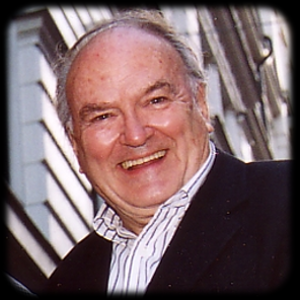
This weekend – jazz weekend, we’ll present legendary jazz scholar, Sam Charters (in a talk given on July 26, 1982 at The Naropa Institute, Boulder, Colorado, on the occasion of the 25th Anniversary On The Road Conference) “Jack’s Jazz’
Today, just a few brief moments from his opening remarks. Tomorrow, a full transcription of his lucid talk.
SC: …what you’ve been hearing is a series of recordings by the finest experimental black swing orchestras of the middle of the 1940s, (it) started off, if you’re interested, with Harland Leonard and the Rockets and (then we) had Gerald Wilson, the last we heard was Billy Eckstine singing “Jelly, Jelly Jelly” and in the trumpet section of the band was Dizzy Gillespie.
The person I was waiting for, John Clellon Holmes,has arrived. [to John Clellon Holmes, as he takes his seat] Perfectly alright, John, I wouldn’t have started without you.



What I’m going to do is I’m going to give you a portrait of the jazz that Jack loved and that he listened to. I’m going to try and narrow it down to talk about three of the jazz musicians that meant the most to him – Charlie Parker, Dizzy Gillespie and Thelonious Monk. I realize that, for a lot of you, rock ‘n roll has kind of obliterated that view of jazz and, in a way, rock ‘n roll has an excitement that jazz was looking for, but jazz, and the jazz of this period, is one of the most exciting creating.. creative movements American music has had, and I hope, to some way, show you a little of that, and I want to show you what jazz felt.. how it felt to Jack.
We said a lot about Jack in the last few days but one thing that we can’t say enough is that Jack loved – Jack loved the things of life, he loved the people of his life, he loved his mother’s apple-pie, he loved Lowell, he loved the rivers, and he also loved jazz. Jack Kerouac loved jazz with an intensity that most of us can’t even imagine. He tried to create what he called a jazz writing-style, a bop writing style, and his fine book of poems, Mexico City Blues,he called that the session of a tenor saxophone blowing long lazy choruses of blues on the afternoon. On the one side, he was looking for the blues, on the other side he was looking for bop. These have had such an important influence on Jack, they’ve helped shape his art (so) that it’s important to know what it was he was looking for.
He gives us a mirror in his books of the jazz that he loved, and his books are a mirror of his life, so, surprisingly.. not surprisingly, in the early books, the jazz doesn’t appear. When we look at Visions of Gerard or Maggie Cassidy or Doctor Sax, the jazz isn’t there. But then you get to On The Road, he mentions Dexter Gordon, Wardell Gray, George Shearing, Slim Galliard – there’s the wonderful “History of Jazz” that he talks about – Lester Young, Stan Getz, Wynonie Harris, Lionel Hampton, Lucky Millinder, Subterraneans, Chu Berry, Count Basie, Sarah Vaughan, Gerry Mulligan, Billy Eckstine, Art Blakey, and a wonderful comment about Thelonious Monk, “sweating, leading the generation with his elbow chords, eyeing the band madly to lead them on, the monk and saint of bop” which is a marvelous description of what he was. And then there’s a just incredible feast of jazz in Visions of Cody, which, as you know, is the parallel book to On The Road. He and Neal listened to jazz, loved jazz, get off with jazz, experience jazz, feel jazz, throughout the book. There are almost too many musicians in it even to mention – Alan Eager, Gerry Mulligan, Billie Holiday, Artie Shaw, Charlie Christian, Billy May, Dizzy Gillespie, Flip Phillips, Stan Kenton, “Artistry in Boogie”, Lionel Hampton, even Jelly Roll Morton, Glenn Miller, Lennie Tristano, Sonny Stitt (Sonny Stitt who died last Friday so one of the great generation is gone) James Moody, Joe Holiday, Brew Moore, King Pleasure. The names go on and on and on, something that to Kerouac was a living presence.
to be continued. (see also here and here)
[Audio for the above may be heard here, (the first approximately five-and-a-half minutes) – and also here]
see https://archive.org/details/On_the_road__The_Jack_Kerouac_conference_82P261
http://cdm16621.contentdm.oclc.org/cdm/singleitem/collection/p16621coll1/id/494/rec/


Sam Charters book poetry of the blues a must read…..his book done with wife Anne about John C. Holmes has many amazing innsights into Holmes and Jack….Buddha trumps the bottle is what I have learned after all these years 🙂